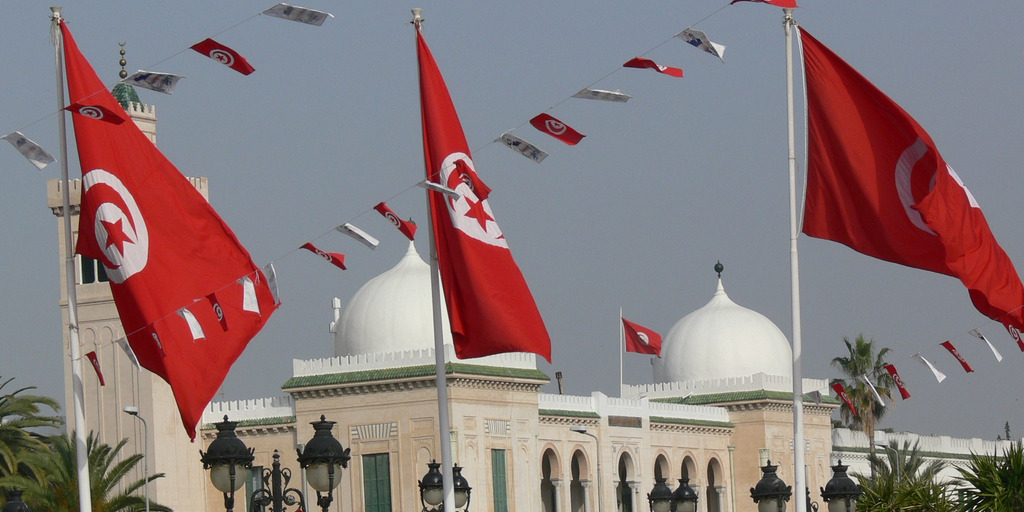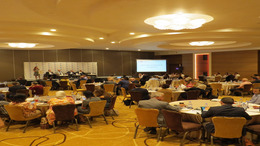Emergency decrees supplant separation of powers
On 25 July 2021, Tunisia’s President Kais Saied independently exercised his powers and declared a state of emergency. With strong approval from the electorate, he suspended the separation of powers, dismissed the prime minister, appointed ministers on his own, froze the work of parliament and dissolved it a little later, lifted the immunity of MPs, and, by way of intervention into the public prosecutor’s office, had various parliamentarians and politicians indicted on corruption charges. Moreover, he imposed travel bans. In October 2021, he appointed a new government under his directive authority. On 13 December 2021, President Saied also announced a comprehensive reform of the current constitution in several steps. Proposals are to be collected in an online survey of the population. These are to be sifted through by a council appointed by the president, which will then draw up concrete amendments. A referendum on the final constitutional amendments is to be held on 25 July 2022. New parliamentary elections are scheduled for December 2022.
It’s unclear: restructuring or abolition of representative democracy
Slowly, the outlines of the president’s intention to transform the governmental system of 2014, which is sensitively balanced between parliamentary and presidential power, into a so-called “moderate presidential system” are becoming visible. How and when this transformation will take place is still completely unclear. The scenarios range from a presidential system with separation of powers and jurisdiction, which the president will shape single-handedly or in consensus with all societal groups, to continuing his authoritarian way of governing, to a system promoted by the president himself, in which the people elect local councils. These, in turn, send deputies to a national parliament, yet without being able to control the government, which is subordinate to the president. Accordingly, more and more voices from civil society are warning of a drift towards authoritarianism. Concern about the president's current course is also growing in the international community. Despite the possibility of online participation of the population, no associations, social groups, civil society organizations or political parties other than the trade union federation (UGTT) are involved in the constitutional amendment process.
An economy in crisis, corruption, a state deficit, and the corona pandemic
The political crisis in Tunisia is taking place against a backdrop of massive economic, financial, social, and health problems. The negative consequences of the Covid-19 pandemic have alarmingly intensified the structural challenges. The state deficit is huge. The debt ratio is projected at around 90.2% of GDP in 2021. The social security funds and state-owned enterprises are operating in deficit. The public budgets need financial subsidies. The 2022 budget provides a meager 3% for investment, according to data from the startup spectrum.
The revenues of entire economic sectors such as tourism are falling. The GDP collapses by almost 9% in 2020. Unemployment has risen to more than 18% in the formal sector in the third quarter of 2021 and by almost 50% in the informal sector. Corruption is rampant and illegal migration to Italy is on the rise. In 2020, 13,000 people left the country, five times more than in 2019, and by the end of 2021, more than 15,500 people emigrated towards Italy.
Additionally, the corona pandemic hit Tunisia so hard in the summer of 2021, that thousands of infected people died and hospitals could no longer accommodate those in need. Fortunately, since August 2021, the EU and 13 member states have been delivering vaccines and medical supplies to hospitals. Even Romania has sent a team of experts. Even though the Corona situation has eased since September 2021, the hospitals still need technical and personnel support. The economic impact of the pandemic will continue to be felt in the future. Since the absence of tourists has led to the deterioration of important infrastructure, the full extent of long-term effects will only become apparent in the coming years.
EU and Tunisia: strong interdependence but little influence?
The degree of interdependence between the European Union and Tunisia has grown substantially over the past ten years. The EU is responsible for 50% of Tunisia’s imports and 70% of its exports. The EU is by far the largest donor in all development aid programs in all project lines within the framework of the European Neighbourhood Policy and through direct budget support. European engagement was also driven by the desire to help the birthplace of the Arab Revolution through the difficult period of transforming from a dictatorship to a representative democracy.
Now, however, Europeans fear that Europe’s extensive and intensive involvement in Tunisia, adding up to around €10 bn in official European development aid alone since the Jasmine Revolution in 2011 (compared to €1,2 bn in the USA), has not yielded sustainable results in terms of promoting democracy, a market economy, and good governance.
Has the EU exerted too little influence to support the fragile democracy? Even the constitutional court, so important for democracy and the separation of powers to function, has not yet been established despite constant European urging. The EU has been reluctant to impose conditionality.
From today's perspective, Brussels and important member states have been far too lenient in dealing with many decision-makers’ unwillingness to reform (the stagnant outflow of funds for projects, as well as the slow and lackluster governance of Tunisian institutions) for fear conditionality could increase the fragility of the only Arab democracy, and apprehensive that it could put the EU at a disadvantage vis-à-vis the Gulf States, Egypt, and Turkey. This concern seems to be put into perspective, as Tunisia - even if Saudi Arabia and the Emirates pledge funds - will still need IMF assistance.
IMF financial assistance is tied to technical and economic reforms designed to strengthen the financial system and improve the business climate. The disagreement on the Tunisian side makes it difficult to start official negotiations on a new aid package.
Among Tunisian decision-makers, a mentality of receiving easy support has stealthily held sway, slackening the will to reform – many sat back and relaxed on the “democracy bonus.” Managers of European projects increasingly report that Tunisia did not have a discussion deficit but a decision-making and implementation deficit.
An alternative narrative places part of the blame on the EU's implementation of economic aid conditionality. The influence of financial incentives has been overestimated. Shared responsibility for the reform program could have helped strengthen the will to implement reforms. Instead, the support and legitimacy of the reforms among the Tunisian elites is lacking due to the perceived dictation of conditions by the EU and the IMF.
In addition, implementing important laws has not progressed due to the bickering of parties in parliament, the bloated administration, and the blocking attitude of important associations. Disappointment with the lack of prosperity despite democracy and the government’s inadequate pandemic management increased the electorate’s disenchantment with parliament and the parties and led to a strong endorsement of President Kais Saied’s authoritarian measures since 25 July 2021.
What can the EU do? Solidarity with the Tunisians!
In this climate, it is difficult for the EU to demand, as it has done since its declaration of 27 July 2021, that the president reinstate parliament when he argues that he knows the people are backing his decisions and parliament and the parties are to blame for the unfortunate situation. In January 2022, President Saied announced new parliamentary elections for December 2022.
On 9 and 10 September 2021, EU Foreign Affairs Representative Josep Borrell met with President Kais Saied and representatives from politics and civil society in Tunis to get a picture of the political and economic crisis. Borrell used his visit to express European solidarity to the Tunisians in overcoming the current critical situation and to hear different opinions on the matter. Additionally, he engaged in discussions regarding contributions to save democracy that could be considered by EU institutions in Brussels.
Reconciling democratic governance and efficient administration
The major challenge is to reconcile the democratic stance of the Tunisian state and its society with an effective, citizen-oriented governance, administration, and economy that visibly reduces corruption. There are several options for the EU to support this path without being criticized as an external meddler:
European principles must be sensitively communicated to the Tunisian president and those responsible in politics, economy, and society: to preserve the democratic acquis, in which civic and human rights play a central role, to establish the democratic rule of law, and to build a functioning separation of powers with an independent legislature and government.
Changes in the constitutional system should only be agreed upon and implemented within the framework of the current constitution and in consensus with the parties and civil society organizations, demands, among other things, a resolution of the European Parliament of 20 October 2021. President Kais Saied has already distanced himself from those ideas at the end of September 2021. He relies on "direct communication with the people" and started an online survey on 15 January 2022, in which all Tunisians at home and abroad can take part. In doing so, he seems to want to bypass the intermediary and representative bodies such as NGOs and parties in the political transformation of the government system.
At the end of September 2021, he also appointed a Prime Minister, which was one of the demands of the EU. Kais Saied – a law professor by profession – repeatedly stresses the importance of law and justice. Therefore, Europeans could offer to help him develop a rule of law system and to establish a constitutional court – key tools to combat corruption, improve democratic governance, and facilitate investment.
Diplomatic offensive
Employing joint action steps in this direction, Josep Borrell could promote coordination between the EU institutions and the EU member states, especially France. Paris is very active here - it traditionally has the greatest influence on the Tunisian elites.
Thus, France donated a significant amount of Covid-19 vaccines. Also, President Emmanuel Macron was the first European politician to speak with President Kais Saied after his decree of July 25, 2021. Moreover, in November 2022, Tunisia is scheduled to host the 18th Francophone Summit.
Nonetheless, cooperation with President Saied is proving difficult for the West. He hardly makes any international appearances, but seeks more intensive contact with Arab rulers such as the presidents of Algeria and Egypt.
Collaboration with Great Britain and the US
In addition to internal European agreement, close coordination with Great Britain and the US will be most effective. Washington and London are promoting important multilateral security projects in Tunisia.
Prevailing over the regional meddlers
The US, the UK, and the EU can send clear messages to their partners and allies in the Gulf states, especially the Emirates, Saudi-Arabia and Qatar, as well as Algeria, Egypt, and Turkey, to stay out of the political process in Tunisia.
In doing so, the West ought to accept that the Tunisian president, in the spirit of pan-Arab orientation, might be inclined to no longer solely focus on financial grants from the West that are linked to reform conditions.
Instead, he might ask Arab countries for deposits into the Tunisian central bank. These may not yet be directly implicitly linked to political demands to backtrack on the democracy agenda, but they would discreetly argue for pushing the Islamic Ennahda party out of the system of government and strengthening authoritarian presidential governance.
However, these cash injections would not be enough to replace an IMF aid package with its reforms, since the Tunisian state's financial needs are too great. According to calculations, Tunis may have difficulties from 2023 in not meeting its international loan repayment obligations.
Financial injections and debt cuts for promised reforms
European and international financial institutions ought to break the vicious circle of injecting more money into public budgets every year without Tunisian decision-makers implementing promised social and economic reforms.
The EU can point to President Saied himself committing to the principles of cooperation under the Euro-Mediterranean Association Agreement between the EU and Tunisia when he met with EU Commission President Ursula von der Leyen, EU Council President Charles Michel and David Maria Sassoli, former President of the European Parliament, in Brussels in June 2021.
Moreover, it is getting increasingly difficult to mobilize loans on acceptable terms for Tunisia. For years, the IMF has also been calling for reform steps to be taken in return for financial aid so that more secure jobs can finally be created and economic growth achieved. A firmly agreed phased plan consisting of financial injections and debt cuts, on the one hand, and the concrete implementation of reform projects and democratic principles, on the other, can help to adhere to the agreed values as well as strengthen the initiative of Tunisian leaders and break the downward spiral of more spending and less revenue.
Reforms are not about disadvantages for the socially weak Tunisians but about aspects such as more independence for the central bank, connection to international digital payment transactions, for example, via PayPal, a fair and transparent tax, finance and credit system, an independent and corruption-free judicial system, as well as fast and leaner official procedures based more on IT. These reforms help small and medium-sized enterprises and start-ups to dynamize their business, create jobs and reduce corruption. What is important is that the EU remains realistic in what it demands of Tunisia and starts where it can objectively expect to have an impact.
Reviewing the interplay between reforms and support
The crisis in Tunisia also raises questions about the effectiveness of European Neighbourhood Policy instruments. It seems that EU-funded economic development measures, infrastructure projects, and financial transfers alone do not trigger the necessary social, economic, and administrative reforms required to modernize a country in terms of full economic and political participation for all of its citizens. Taking stock of how the economic, financial, and technological interdependence between the EU and its neighbors works can provide insights. In addition, it should be examined in which areas valuable potential cannot be realized due to outdated agreements, thereby hindering trade and economic growth.
Growth in Italy, France, and Spain help Tunisia
If funds earmarked for Tunisia cannot be called up or invested and/or if key democratic principles are not preserved or reinstalled, there is still an indirect way for the EU Commission to help relieve the pressure on the Tunisian labor market. Brussels could invest these funds into the economic recovery in the southern EU member states, especially in Italy, France, and Spain, in addition to the EU Corona Reconstruction Fund. Recovery in those southern EU member states would benefit Tunisian industry and agriculture by easing the local labor market, enlarging job opportunities for Tunisian seasonal workers, and increasing remittances to families back home.
This post has also appeared in slightly modified form on the BTI Blog and the GED Blog.



![[Translate to English:] Gruppenbild mit tunesischer Delegation, den georgischen und ukrainischen Verhandlungsführerinnen Tamara Kovzeridze und Veronika Movchan sowie den Vertretern der Bertelsmann Stiftung Miriam Kosmehl und Christian-Peter Hanelt](/fileadmin/files/_processed_/0/7/csm_1920756516IMG_0123_e448663d83.jpg)



